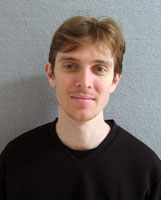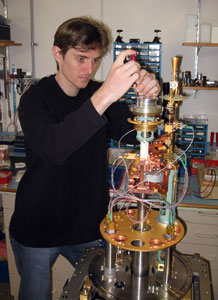Alex Dunning - Electronics Technician

Tell us about yourself.
I've been a Sydney boy most of my life, growing up in the western suburbs near Blacktown. I'm 26 now and working for the ATNF building receiver systems for radio telescopes.
Where did you go to school and how did you get into Engineering?
After school I started working straight away so any study I have done since has been part time. The first course I did was a Diploma in electronics at TAFE as part of my apprenticeship. My real interest was in Physics however so after a year of the diploma I started a science degree at the University of Technology in Sydney. I chose UTS because it seemed the more flexible of the two universities that ran part time degrees. For three years I tried to juggle work, the Diploma and the degree all at the same time. I’m sure all three suffered as a result, as well as my sanity. It is not a path I would recommend. Now, finally, I’m finished both but that’s only part of the journey. Maybe next year I will start a PhD.
What has been your career path so far?
My first fulltime job was as an apprentice pipe organ restorer but soon found that although it was an interesting job it wasn't for me. When a position came up at the ATNF as a trainee electronics technician I thought it might suit me better. My role here has changed a lot over the years. Starting as a trainee meant a lot of repetitive tasks initially but as I began to understand more about microwave engineering more interesting work came along. Now I spend most of my time designing microwave devices which suits me just fine.
What does a typical work day involve?
My official position is electronics technician however the work we do here is not exactly what most electronics technicians do. I spend much of my time designing high frequency electronic components such as amplifiers and antennas using computer simulation software. I suppose in many places that is all the engineers would do but here because we are only a small group everyone does a bit of everything. So some days I might find myself building a receiver or testing devices or machining metal or any one of a hundred other tasks involved in making the telescopes run. So we see the whole cycle from conception of the idea to operation there is always plenty of variety.

What is the most interesting thing about being an engineer?
As an engineer you are probably not likely to make a world changing breakthrough. That's not to say the job is without satisfaction. It is the small improvements, designing a better gizmo or thinking of a better way to do something. It can be very satisfying to see something you have designed built and work just as you plan, even though that certainly doesn't happen every time. As for the single most satisfying thing well seeing the signals from the NASA Mars probe as they were received by a receiver which I helped design left me quite chuffed.
What have been your highlights?
As for the single most satisfying thing I've done seeing the signals from the NASA Mars probe as they were received by a receiver which I helped design left me quite chuffed.
Are there any downsides or frustrations in your work?
A job in engineering can be difficult but the challenge is all part of the appeal. The worst part of my job is if someone spends a long time making something that you have designed and it doesn't work because you have made a mistake or have overlooked something. We work in pretty tight teams here and you don't just let yourself down if you stuff up.
What motivated you to choose a career in science/astronomy? Were you a natural at it in school?
I always was quite good at science in school but never really had much interest, let's face it high school science can be pretty boring. I was much more interested in sports and music as most young people are. In Year 10 however I was sent to a physics course at the Australian National University. I didn't learn very much there but they did show me that there were still some great unanswered questions in science. This sparked an interest that has persisted to this day.
What do you see your career ten years from now?
I suppose the ultimate aim of any scientist is to have the freedom (and money) to do the research they want to do. That's what I would like to be doing at some point in the future. For now I am quite happy continuing my small contribution to astronomy.
What do you do when not at work?
I love playing the guitar! There's nothing better than locking yourself away with a very loud amp and playing till the neighbours complain. I also like to go snowboarding whenever I have the chance or indoor rock climbing or just a casual game of pool down the pub.
What advice or suggestions would you make to young people considering a career in science?
I would say don't do what I did and take the cautious approach worrying whether or not there would be a job at the end of it. Just dive in, if it's not for you it will become obvious soon enough and if it is there are plenty of science careers out there for those who work hard enough.
